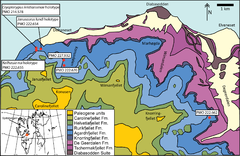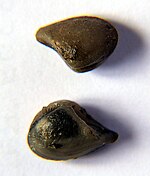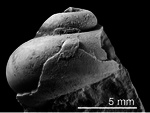Agardhfjellet Formation
| Agardhfjellet Formation | |
|---|---|
| Stratigraphic range: Oxfordian-Berriasian ~ | |
 Geologic map of central Svalbard with the formation in dark blue | |
| Type | Formation |
| Unit of | Adventdalen Group |
| Sub-units | Oppdalsåta & Slottsmøya Members |
| Underlies | Rurikfjellet Formation |
| Overlies | Knorringfjellet Formation |
| Lithology | |
| Primary | Mudstone |
| Other | Dolomite |
| Location | |
| Coordinates | 78°18′N 15°48′E / 78.3°N 15.8°E |
| Approximate paleocoordinates | 69°36′N 16°18′E / 69.6°N 16.3°E |
| Region | Svalbard |
| Country | |
| Extent | Central Spitsbergen Basin |
The Agardhfjellet Formation is a geologic formation in Svalbard, Norway. It preserves fossils dating back to the Oxfordian to Berriasian stages, spanning the Late Jurassic-Early Cretaceous boundary.[1] The formation contains the Slottsmøya Member, a highly fossiliferous unit (Lagerstätte) where many ichthyosaur and plesiosaur fossils have been found, as well as abundant and well preserved fossils of invertebrates.[2][3]
Description
The formation overlies the Knorringfjellet Formation and is overlain by the Rurikfjellet Formation. The formation comprises the lower Oppdalsåta and upper Slottsmøya Members. The Slottsmøya Member, which averages 55 to 60 metres (180 to 197 ft) in thickness in the study area, consists of dark-grey to black silty mudstone, often weathering to paper shale, and discontinuous silty beds with local occurrences of red to yellowish sideritic concretions as well as siderite and dolomite interbeds.[3] It consists of a mix of shales and siltstones which were deposited in a shallow marine environment, near a patch of deeper marine sediment.[4] The seafloor, which was located about 150 metres (490 ft) below the surface, seems to have been relatively dysoxic, or oxygen-poor, although the diversity of the benthic fauna suggest that these environments were likely not truly anoxic and that oxygen-depletion may have been a seasonal phenomenon.[5][6] Although direct evidence from Slottsmøya is currently lacking, the high latitude of this site and relatively cool global climate of the Tithonian suggest that some sea ice was likely present at least in the winter. There is evidence for the presence of sea ice and glaciers from coeval deposits in eastern Europe and the Volga region of Russia (which shares a number of fauna with those known from the Slottsmøya Member), which were further south than Svalbard at the time.[7][8]
These sites represent shallow-water methane seeps which were spread over a relatively large geographic area, and like modern day seeps, they supported high biodiversity. Near the top of the member, various assemblages of invertebrates have been discovered; these include ammonites, bivalves, lingulate brachiopods, rhynchonellate brachiopods, tubeworms, belemnoids, tusk shells, sponges, crinoids, sea urchins, brittle stars, starfish, crustaceans, and gastropods, numbering 54 taxa in total. The most common and abundant of these taxa were bivalves and brachiopods, each of which make up 27.8% of the known seep fauna. Several chemosymbiotic species are known, such as the bivalve Nucinella.[5] Outside of the cold seeps, several non-seep-restricted invertebrates were also present in abundance.[6] In addition to the invertebrates, the Slottsmøya Member has also revealed a diverse assemblage of marine reptiles, including several taxa of ichthyosaurs and plesiosaurs. Many of these specimens are relatively complete and in articulation, which is rare among Jurassic marine fossil sites.[6] It thus provides a unique and detailed glimpse into the boreal seas of the Late Jurassic. As it spans the Jurassic-Cretaceous boundary, it is also important to understanding how marine ecosystems changed going into the Cretaceous.
Paleobiota
Color key
|
Notes Uncertain or tentative taxa are in small text; |
The formation, especially the Slottsmøya Member, has provided an abundance of marine fossils dating to the Late Jurassic-Early Cretaceous.[3]
The timeline below follows stratigraphic data provided in Delsett et al. 2018 and Roberts et al. 2020. [9][10]

Vertebrates
Bony Fish
| Bony Fish from the Agardhfjellet Formation | ||||||
|---|---|---|---|---|---|---|
| Genus | Species | Location | Member | Material | Notes | Images |
| Leptolepis[11] | L. nathorsti | Oppdalssåta & Lardyfjellet Members | ||||
Plesiosaurs
| Plesiosaurs from the Agardhfjellet Formation | ||||||
|---|---|---|---|---|---|---|
| Genus | Species | Location | Member | Material | Notes | Images |
|
T. svalbardensis |
Slottsmøya Member |
Reassigned to the genus Colymbosaurus after further analysis[12] | ||||
| Colymbosaurus | C. svalbardensis | Slottsmøya Member | A colymbosaurine cryptoclidid, also known from the Kimmeridge Clay |  | ||
| Djupedalia | D. engeri | Slottsmøya Member | A cryptoclidid plesiosaur | |||
| Ophthalmothule | O. cryostea | Slottsmøya Member | Extensive skeletal material including a complete cranium | A cryptoclidid plesisosaur which has unusually large orbits.[10] |  | |
| Spitrasaurus | S. wensaasi | Slottsmøya Member | A cryptoclidid plesiosaur related to Ophthalmothule | |||
| S. larseni | ||||||
| Pliosaurus | P. funkei | Slottsmøya Member | Known from two partial skeletons | A large thalassophonean pliosaurid which was informally known as "Predator X" prior to being named. This species is notable for having unusually large paddles in comparison to its body size. | ||
Ichthyosaurs
| Ichthyosaurs from the Agardhfjellet Formation | ||||||
|---|---|---|---|---|---|---|
| Genus | Species | Location | Member | Material | Notes | Images |
| Cryopterygius | C. kristiansenae | Slottsmøya Member | Junior synonym of Undorosaurus gorodischensis | |||
| Undorosaurus | U. gorodischensis | Slottsmøya Member | A single, largely complete specimen | A large platypterygiine ichthyosaur, also known from the Russian Volga.[13] |  | |
| Janusaurus | J. lundi | Slottsmøya Member | Junior synonym of Arthropterygius lundi | |||
| Palvennia | P. hoybergeti | Slottsmøya Member | Junior synonym of A. hoybergeti | |||
| Keilhauia | K. nui | Slottsmøya Member | A nomen dubium referred to A. sp. cf. chrisorum | |||
| Arthropterygius | A. lundi | Slottsmøya Member | Several specimens of varying ages, previously referred to several other genera | A widespread genus of ophthalmosaurid ichthyosaur, also known from Canada, Russia, and Argentina. Is present both before and directly after the Jurassic-Cretaceous Boundary. [14] | ||
| A. hoybergeti | ||||||
| A. chrisorum | ||||||
| Nannopterygius | N. borealis | Slottsmøya Member | An ophthalmosaurid ichthyosaur present in early Cretaceous strata. This genus is also known from the Kimmeridge Clay and from fossil sites in the Volga.[15] |  | ||
| Brachypterygius | B. sp. | Slottsmøya Member | Partial skull | Referred to Brachypterygius by Angst et al. (2010)[16] | ||
Invertebrates
An unnamed galatheid squat lobster is known from a single, poorly preserved fragment.[5]
Cephalopods
Large belemnoid arm hooks are known.[17]
| Cephalopods from the Agardhfjellet Formation | ||||||
|---|---|---|---|---|---|---|
| Genus | Species | Location | Member | Material | Notes | Images |
| Craspedites[18] | C. okensis | Slottsmøya Member |  | |||
| C. originalis | ||||||
| Borealites | B. rossicus | Slottsmøya Member | ||||
| B. sp. | ||||||
| Hectoroceras | H. kochi | Slottsmøya Member | ||||
| H. sp. | ||||||
| Kachpurites | K. sp. | Slottsmøya Member | ||||
| Surites | S. spasskensis | Slottsmøya Member | ||||
| S. spasskensoides | ||||||
| S. tzikwinianus | ||||||
| S. mesezhnikovi | ||||||
| Tollia | T. tolli | Slottsmøya Member | ||||
Echinoderms
| Echinoderms from the Agardhfjellet Formation | ||||||
|---|---|---|---|---|---|---|
| Genus | Species | Location | Member | Material | Notes | Images |
| Chariocrinus | C. sp. | Slottsmøya Member | A form of isocrinid crinoid |  | ||
| Hemipedina | H. sp. | Slottsmøya Member | A species of pedinoid sea urchins related to the extant Caenopedina |  | ||
| Polarasterias | P. janusensis | Slottsmøya Member | Nearly complete specimen | A forcipulatid sea star | ||
| Savignaster | S. septemtrionalis | Slottsmøya Member | A pterasterid sea star |  | ||
| Ophiogaleus | O. sp. | Slottsmøya Member | A ophiacanthid brittle star | |||
| Ophioculina | O. hoybergia | Slottsmøya Member | An ophiurine brittle star | |||
Bivalves
Remains of possible anomiid clams have been found which are as yet undescribed.
| Bivalves from the Agardhfjellet Formation | ||||||
|---|---|---|---|---|---|---|
| Genus | Species | Location | Member | Material | Notes | Images |
| Pseudotrapezium | P. aff. groelandicum | Slottsmøya Member | An arcticid clam which constitutes nearly half of the fauna recovered from the seep assemblages. |  | ||
| Mesosaccella | M. rogovi | Slottsmøya Member | ||||
| M. toddi | ||||||
| Nucinella | N. svalbardensis | Slottsmøya Member | The most abundant chemosymbiotic species in the Spitsbergen seeps. |  | ||
| Buchia | B. sp | Slottsmøya Member | ||||
| Solemya | S. cf. woodwardiana | Slottsmøya Member | A burrowing chemosymbiotic bivalve which is very abundant in the seep sites | |||
| Tehamatea | T. rasmusseni | Slottsmøya Member | A lucinid clam |  | ||
| Cretaxinus | C. hurumi | Slottsmøya Member | A thyacirid clam | |||
| Camptonectes | C. spp | Slottsmøya Member | A pectinid clam represented by at least two species | |||
| Oxytoma | O. octavia | Slottsmøya Member | ||||
| Pseudolimea | P. arctica | Slottsmøya Member | ||||
| Dacromya | D. chetaensis | Slottsmøya Member | Rare |  | ||
| Goniomya | G. literata | Slottsmøya Member | Rare | |||
Serpulids
| Serpulids from the Agardhfjellet Formation | ||||||
|---|---|---|---|---|---|---|
| Genus | Species | Location | Member | Material | Notes | Images |
| Propomatoceros | P. sp. | Slottsmøya Member | A serpulid tube worm |  | ||
| aff. Pyrgopolon | aff. P. nodulosum | Slottsmøya Member | A serpulid tube worm which forms mass accumulations in the Echinoderm Bed | |||
| Nogrobs | N. sp. | Slottsmøya Member | ||||
Brachiopods
| Brachiopods from the Agardhfjellet Formation | ||||||
|---|---|---|---|---|---|---|
| Genus | Species | Location | Member | Material | Notes | Images |
| Lingularia | L. similis | Slottsmøya Member | The most abundant species of brachiopod that is present in Slottsmøya | |||
| Ptilorhynchia | P. mclachlani | Slottsmøya Member | A rhynchonellide brachiopod |  | ||
Gastropods
| Gastropods from the Agardhfjellet Formation | ||||||
|---|---|---|---|---|---|---|
| Genus | Species | Location | Member | Material | Notes | Images |
| Ambercyclus | A. sp. | Slottsmøya Member | The most abundant species of gastropod that is known from the Slottsmøya seep deposits | |||
| Hudlestoniella | H. sp. | Slottsmøya Member | A rissoid gastropod |  | ||
| Cantrainea | C. sp. | Slottsmøya Member | A turbinid gastropod; it is rare and only known from one of the seep sites |  | ||
See also
References
- ^ Connors, Marisa Leigh (2017). Deciphering the Late Jurassic paleoenvironment through Re-Os isotope geochemistry of the Agardhfjellet Formation, Svalbard (Thesis). Colorado State University.
- ^ Delsett et al., 2019, p.741
- ^ a b c Agardhfjellet Formation at Fossilworks.org
- ^ Hurum, J.H.; Nakrem, H.A.; Hammer, O.; Knutsen, E.M.; Druckenmiller, P.S.; Hryniewicz, K.; Novis, L.K. (2012). "An Arctic Lagerstätte – the Slottsmøya Member of the Agardhfjellet Formation (Upper Jurassic-Lower Cretaceous) of Spitsbergen" (PDF). Norwegian Journal of Geology. 92: 55–64. ISSN 0029-196X.
- ^ a b c Hryniewicz, K.; Nakrem, H.A.; Hammer, O.; Little, C.T.S.; Kaim, A.; S., M.R.; Hurum, J.H. (2015). "The palaeoecology of the latest Jurassic–earliest Cretaceous hydrocarbon seep carbonates from Spitsbergen, Svalbard". Lethaia. 48 (3): 353–374. doi:10.1111/let.12112.
- ^ a b c Delsett, L.L.; Novis, L.K.; Roberts, A.J.; Koevoets, M.J.; Hammer, O.; Druckenmiller, P.S.; Hurum, J.H. (2015). "The Slottsmøya marine reptile Lagerstätte: depositional environments, taphonomy and diagenesis" (PDF). In Kear, B.P.; Lindgren, J.; Hurum, J.H.; Milan, J.; Vajda, V. (eds.). Mesozoic Biotas of Scandinavia and its Arctic Territories. Geological Society of London, Special Publications. Vol. 434. pp. 165–188. doi:10.1144/SP434.2. S2CID 130478320.
{{cite book}}:|journal=ignored (help)[permanent dead link] - ^ Galloway, J.M.; Sweet, A.R.; Swindles, G.T.; Dewing, K.; Hadlari, T.; Embry, A.F.; Sanei, H. (June 2013). "Middle Jurassic to Lower Cretaceous paleoclimate of Sverdrup Basin, Canadian Arctic Archipelago inferred from the palynostratigraphy". Marine and Petroleum Geology. 44: 240–255. doi:10.1016/j.marpetgeo.2013.01.001.
- ^ Price, Gregory G. (1999). "The evidence and implications of polar ice during the Mesozoic". Earth-Science Reviews. 48 (3): 183–210. Bibcode:1999ESRv...48..183P. doi:10.1016/S0012-8252(99)00048-3.
- ^ Delsett, L.L.; Druckenmiller, P.S.; Roberts, A.J.; Hurum, J.H. (October 12, 2018). "A new specimen of Palvennia hoybergeti: implications for cranial and pectoral girdle anatomy in ophthalmosaurid ichthyosaurs". PeerJ. 6: e5776. doi:10.7717/peerj.5776. PMC 6187996. PMID 30345178.
- ^ a b Roberts, A.J.; Druckenmiller, P.S.; Cordonnier, B.; Delsett, L.L.; Hurum, J.H. (2020). "A new plesiosaurian from the Jurassic–Cretaceous transitional interval of the Slottsmøya Member (Volgian), with insights into the cranial anatomy of cryptoclidids using computed tomography". PeerJ. 8: e8652. doi:10.7717/peerj.8652. PMC 7120097. PMID 32266112.
- ^ Koevoets, Maayke J.; Hurum, Jørn H.; Hammer, Øyvind (17 April 2018). "New Late Jurassic teleost remains from the Agardhfjellet Formation, Spitsbergen, Svalbard". Norwegian Journal of Geology. 98 (2). doi:dx.doi.org/10.17850/njg98-2-01.
{{cite journal}}: Check|doi=value (help) - ^ E. M. Knutsen, P. S. Druckenmiller, and J. Hurum. 2012. Redescription and taxonomic clarification of ‘Tricleidus’ svalbardensis based on new material from the Agardhfjellet Formation (Middle Volgian). Norwegian Journal of Geology 92:175-186
- ^ Nikolay G. Zverkov; Vladimir M. Efimov (2019). "Revision of Undorosaurus, a mysterious Late Jurassic ichthyosaur of the Boreal Realm". Journal of Systematic Palaeontology. 17 (14): 963–993. doi:10.1080/14772019.2018.1515793. S2CID 91912834.
- ^ Zverkov, Nikolay G.; Prilepskaya, Natalya E. (2019). "A prevalence of Arthropterygius (Ichthyosauria: Ophthalmosauridae) in the Late Jurassic—earliest Cretaceous of the Boreal Realm". PeerJ. 7: e6799. doi:10.7717/peerj.6799. PMC 6497043. PMID 31106052.
{{cite journal}}: CS1 maint: unflagged free DOI (link) - ^ Nikolay G. Zverkov; Megan L. Jacobs (2020). "Revision of Nannopterygius (Ichthyosauria: Ophthalmosauridae): reappraisal of the 'inaccessible' holotype resolves a taxonomic tangle and reveals an obscure ophthalmosaurid lineage with a wide distribution". Zoological Journal of the Linnean Society. Online edition: 228–275. doi:10.1093/zoolinnean/zlaa028.
- ^ ANGST, D.; BUFFETAUT, E.; TABOUELLE, J.; TONG, H. (2010). "An ichthyosaur skull from the Late Jurassic of Svalbard". Bulletin de la Société Géologique de France. 181 (5): 453–458. doi:10.2113/gssgfbull.181.5.453.
- ^ HAMMER, Ø.; HRYNIEWICZ, K.; HURUM, J.H.; HØYBERGET, M.; KNUTSEN, E.M.; NAKREM, H.A. (4 May 2012). "Large onychites (cephalopod hooks) from the Upper Jurassic of the Boreal Realm". Acta Palaeontologica Polonica (58). doi:10.4202/app.2012.0020.
- ^ Wierzbowski, A.; Hryniewicz, K.; Hammer, Ø.; Nakrem, H.A.; Little, C.T.S. (October 2011). "Ammonites from hydrocarbon seep carbonate bodies from the uppermost Jurassic – lowermost Cretaceous of Spitsbergen and their biostratigraphical importance". Neues Jahrbuch für Geologie und Paläontologie. 262 (3): 267–288. doi:10.1127/0077-7749/2011/0198.
Bibliography
- Agardhfjellet Formation
- Geologic formations of Norway
- Jurassic Norway
- Lower Cretaceous Series of Europe
- Cretaceous Norway
- Mudstone formations
- Dolomite formations
- Deep marine deposits
- Open marine deposits
- Fossiliferous stratigraphic units of Europe
- Paleontology in Norway
- Geology of Svalbard
- Tithonian Stage
- Berriasian Stage
- Jurassic System of Europe


